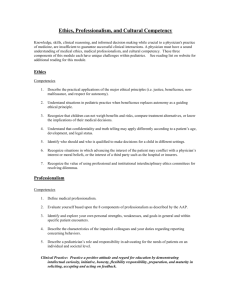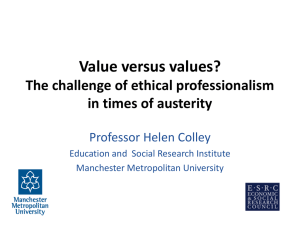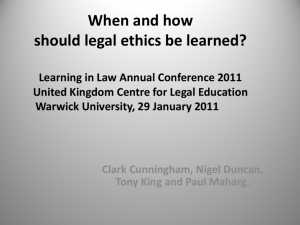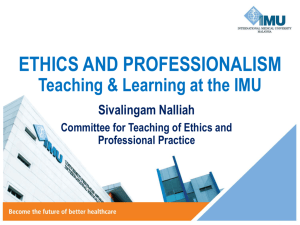CHAPTER 3
advertisement
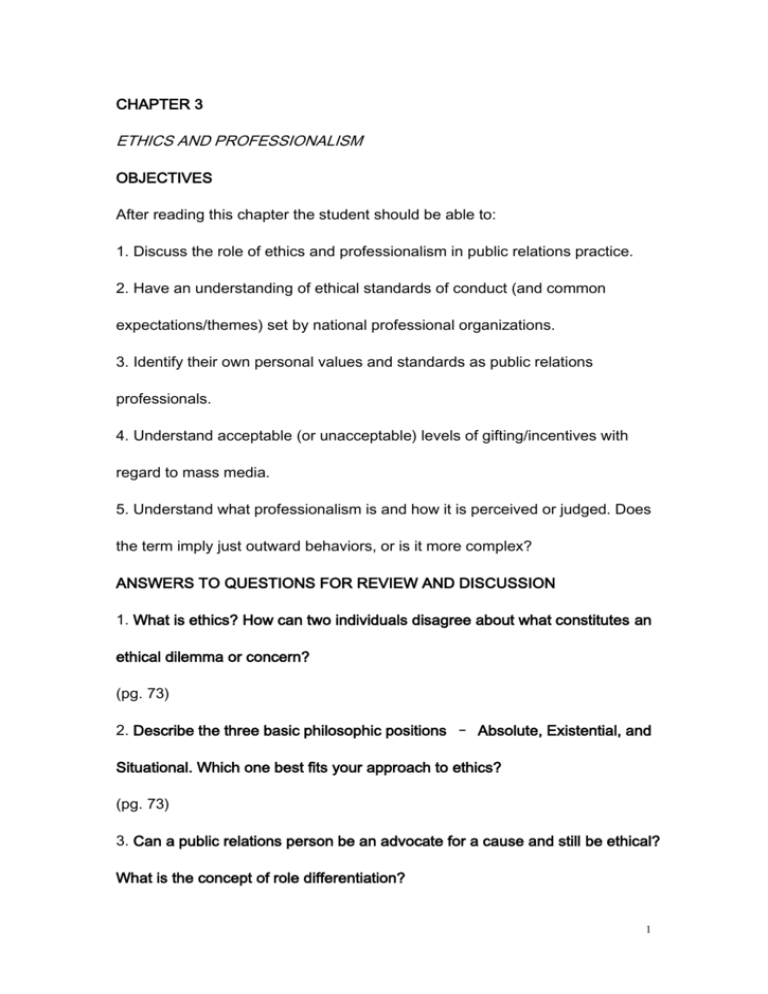
CHAPTER 3 ETHICS AND PROFESSIONALISM OBJECTIVES After reading this chapter the student should be able to: 1. Discuss the role of ethics and professionalism in public relations practice. 2. Have an understanding of ethical standards of conduct (and common expectations/themes) set by national professional organizations. 3. Identify their own personal values and standards as public relations professionals. 4. Understand acceptable (or unacceptable) levels of gifting/incentives with regard to mass media. 5. Understand what professionalism is and how it is perceived or judged. Does the term imply just outward behaviors, or is it more complex? ANSWERS TO QUESTIONS FOR REVIEW AND DISCUSSION 1. What is ethics? How can two individuals disagree about what constitutes an ethical dilemma or concern? (pg. 73) 2. Describe the three basic philosophic positions – Absolute, Existential, and Situational. Which one best fits your approach to ethics? (pg. 73) 3. Can a public relations person be an advocate for a cause and still be ethical? What is the concept of role differentiation? 1 4. What role do professional organizations play in setting the standards of public relations practice? (pg. 75) 5. Describe, in general, the activities of PRSA, IABC, and IPRA. (pgs. 75-77) 6. A number of professional groups have codes of ethics. What are some common characteristics of these codes? What differences are there, if any? (pg. 77) 7. What is the controversy about television stations using video news releases (VNRs) provided by public relations sources? (pg. 79) 8. What ethical rules apply to Internet public relations and participation in chat groups? (pg. 81) 9. Is public relations a profession? Why or why not? (pg. 82) 10. Name the four ways that an individual can act like a professional. (pg. 83) 11. In what ways does the concept of “careerism” and “technician mentality” undermine the establishment of public relations as a profession? (pg. 83) 2 12. What are the pros and cons of licensing in public relations? Would you support licensing? Would you support licensing? Why or why not? (pgs. 84-85) 13. What is the accreditation process in public relations? What is involved? Would you aspire to be accredited? Why or why not? (pg. 85) 14. What are the two major think tanks in the public relations field? What do they do? (pg. 87) 15. What is a “front group”? Do you think they are unethical? Why or why not? (pg. 88) 16. The Pentagon had a program that gave Iraqi journalists cash for running favorable stories about the U.S. occupation. Do you think such a practice is ethical? Why or why not? (pg. 90) 17. Should public relations personnel give gifts to journalists? Why or why not? (pg. 89-90) 18. What is the concept of “pay for play”? Who’s more ethical: the public relations person who offers the cash, or the journalist who accepts it? (pg. 93) 19. Some celebrities on television programs such as the Today Show. Should they also disclose what company or organization is paying them to appear? 3 Why or why not? (pg. 93) 20. When companies operate in other nations, should they adhere to the standards of their home country or adapt to the ethical standards of the host nations? For example, should American companies pay bribes to journalists in Russia if that is the standard operating practice? (pg. 90) 4







